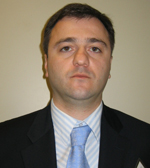2nd Implementation Cycle - Review Session
1-12 May 2006
New York
CSD-14
[an error occurred while processing this directive]Message from the Chair: H.E. Mr. Aleksi Aleksishvili
Georgia
 At the 2005 World Summit, Government leaders reaffirmed their commitment to achieve the goal of sustainable development through the implementation of Agenda 21 and the Johannesburg Plan of Implementation. Highlighting serious and multiple challenges ahead, they pledged to act with resolve and urgency.
At the 2005 World Summit, Government leaders reaffirmed their commitment to achieve the goal of sustainable development through the implementation of Agenda 21 and the Johannesburg Plan of Implementation. Highlighting serious and multiple challenges ahead, they pledged to act with resolve and urgency.
The Summit provides a significant backdrop for the fourteenth session of the Commission on Sustainable Development (CSD-14), which focuses on the thematic cluster of energy for sustainable development, industrial development, air pollution/atmosphere and climate change. Making progress in these issues is crucial for achieving internationally agreed development goals, including MDGs and Johannesburg targets. The Summit’s emphasis on action is reinvigorating our commitment to implementation, inaugurated in Johannesburg in 2002.
As a review session, CSD-14 is tasked with identifying barriers and constraints and best practices in implementation in the selected thematic cluster. As Chairman of CSD-14, I will do my utmost to help ensure that the review session will result in an improved understanding of priority concerns and lay the groundwork for an effective policy year. It is also my firm belief that CSD-14 can and should catalyse concrete action at the national, regional and international level by all stakeholders. Working together, we can advance implementation.
As the first Minister of Finance elected to the Chairmanship of CSD, I attach great importance to the financing and investment challenges in the thematic cluster. I will do my best to mobilize the participation of my fellow finance Ministers in CSD. I intend to engage international financial institutions and the private sector in CSD activities.
As we prepare for CSD-14, let us not lose sight of a deplorable fact - today, over 2 billion people in developing countries live without access to modern energy services, relying on traditional biomass. For those people, this data represents a harsh reality. Fuel wood remains the main source of their energy supply. The daily need for gathering firewood, often trekking for miles, is a lost opportunity for schooling, healthier life and productive employment, especially for girls and women.
CSD-14 should aim at having a real impact on improving access to reliable, affordable, and clean energy services.
Intricately linked with energy is climate change and air pollution. Reducing greenhouse gas emissions calls for renewed efforts to improve energy efficiency, promote technological innovations, including advanced fossil fuel technologies, expand markets for renewable energy sources and foster cleaner fuels for transportation. Such efforts, along with adaptation strategies, will help strengthen resilience, address air pollution and other atmospheric problems, including trans-boundary air pollution.
As a large energy-consuming sector and a significant source of GHG emissions and air pollution, industry is likewise linked with energy, climate change, and air pollution. Promoting sustainable consumption and production patterns and a recycling economy, including through corporate social responsibility, will help tackle the environmental dimensions of industry. At the same time, the development aspects of industry must be accorded equal attention. CSD-14 should address the urgent need for fostering economic growth in developing countries through, among other measures, increased investments in infrastructure and broad-based industrial development that creates jobs and generates income, including through small- and medium-sized enterprises.
The thematic issues before CSD-14/15 are closely linked in their economic, social and environmental dimensions. We should avoid compartmentalizing them and putting them in silos. It is my firm belief that they should be dealt with in an integrated manner, as called for by CSD-11, along with cross-cutting issues and means of implementation. By adopting an integrated approach and relying on its unique strengths, the Commission can identify win-win solutions that maximize synergies in implementation.
As a high-level body on sustainable development within the United Nations system, the Commission is widely expected to play a lead role in galvanizing action in implementing Agenda 21 and the Johannesburg Plan of Implementation. Governments, international organizations and major groups stakeholders look to the Commission for action-oriented initiatives. To make this happen, I will work closely with my colleagues on the Bureau, with fellow Ministers with relevant portfolios, and with major groups stakeholders.
I will carry on the spirit of reform launched in CSD-11 and continue to improve the methods of work of the Commission to further enhance its dynamics and interactivity. The review session will benefit from national reports, Secretary-General’s reports, contributions from UN agencies and major groups, as well as case studies.
CSD-14 will also integrate the outcomes of regional implementation meetings into its deliberations and bring regional perspectives to bear on the global review. In this regard, I wish to underscore the special vulnerabilities of SIDS and the need for organizing a productive SIDS day during the session.
Furthermore, CSD-14 will continue to feature a rich variety of activities through an enhanced Partnerships Fair, Learning Centre and Side Events. Announcements on these activities will soon be posted on the CSD Secretariat’s website.
Our work does not start with the opening of CSD-14 on 1 May 2006. Our work starts now. Let’s join our forces to make CSD-14 a success. Working in partnership, we can make a difference.
[an error occurred while processing this directive]

